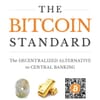In 2008, an anonymous programmer presented an innovative concept to a modest online mailing list: a fully peer-to-peer electronic cash system without the need for a trusted intermediary. Initially, it captured minimal attention. A decade later, defying expectations, this pioneering decentralized software emerged as a formidable alternative to traditional central banking systems, providing a secure and universally accessible option in the form of bitcoin. "The Bitcoin Standard" delves into bitcoin's historical backdrop, its rapid growth due to unique economic properties, and its potential impact on economics, politics, and society.
The challenge bitcoin aims to address—the transfer of value across time and space—echoes a dilemma as ancient as civilization itself. The author, Ammous, guides readers through the evolution of money, from the early barter systems involving shells and stones to the complexities of metal coins, the gold standard, and contemporary government debt. He explores the factors that endowed these mediums with monetary significance and why they eventually faltered, offering insights into the qualities of reliable money. This exploration sets the groundwork for discussing bitcoin's influence on long-term planning, wealth generation, trade, peace, culture, and art. Ammous argues convincingly that the most significant human achievements have historically occurred under sound monetary systems, just as the decline of civilizations has often paralleled the collapse of their currencies.
Further, the book simplifies how bitcoin operates: a decentralized network transforming energy and computational power into verifiable transactions. This enables the execution of monetary transactions over the internet without reliance on traditional institutions or physical infrastructure. Bitcoin represents the first successful instance of digital cash and hard money, distinguished by its automated, predictable monetary policy and its capacity for swift, large-scale settlements globally, akin to a digital gold with inherent settlement mechanisms.
Ammous masterfully combines a deep understanding of technological potential with a nuanced perspective on monetary history, offering a compelling view of bitcoin as a voluntary, market-driven currency. It challenges governmental financial monopolies, tilting sovereignty towards individuals and presenting a vision of a world where money transcends political and geographical limitations.



